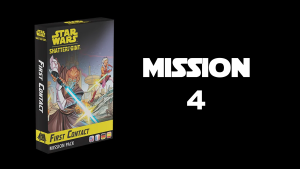This week we take a look at a unit that has been on the table for awhile, the Snail Tank.
We’re going to take a look at its pros, its cons, and some ways you can put one in your armies.
If you want to see the unit guide for the AAT, the other tank the Separatists can bring, find it here.
Pros
- Transport
- Fast Movement
- Good Damage
Cons
- Huge Weak Points
- Vulnerable to Ion
- Can struggle to move over terrain
Overview

145 Points. Starting at a relatively cheap price for a tank. The Snail tank has a base price of 145. However, this is slightly deceptive as you are required to take a minimum 3 point Programming upgrade, raising the minimum cost to 148. You are also likely sticking some other upgrades on this tank so it usually ends up costing around the 155-160 point range. Still quite affordable.
Offense. The base unit card comes equipped with some decent fire power to start. First we do have surge to hit making our dice pools much more consistent. We also get Arsenal 2 allowing us to use two different weapons for each attack. The first weapon on this card is a spicy one, Ion Cannons. Having a range of only 1-2 on this weapon does require you to get close. In return you get a single rainbow of dice, Impact 1 and Ion 1. The keywords on this weapon give it some great utility, helping to deal damage to armor as well as frighten any vehicles or droids with Ion. The second weapon is the Heavy Repeating Blasters. This weapon is the ‘main’ weapon of the tank, able to shoot range 1-4 with 5 dice. This weapon does have Critical 1 which isn’t super critical (groan) as the tank already surges to hit. However it does allow this weapon to do a little extra against dodges, cover, or armor potentially. Interestingly this weapon doesn’t actually have Impact so isn’t actually that great when attacking armor.
Defense. The Snail Tank comes with 11 wounds and a surging white save, hidden behind armor. This is the same as an AT-ST. This profile is quite durable just on the face of it. The biggest downside however is that the Snail Tank has Weak Point: Sides. This means that units shooting at the tank will get Impact 1 when in its side arcs. Because of the massive oblong base and the fact that this tank will likely want to fight near the enemy, you will likely end up taking quite a few weak point shots. This means that enemies will find it a lot easier to burn through that 11 health than you might think.
Maneuverability. The Snail Tank is actually quite maneuverable for something its size. Coming on a massive 200mm base, the snail can move a whooping 10.7″ per move, which is almost range 2. This is also aided by Reposition, giving you a free pivot as a part of a move. This allows the Snail Tank to get where it wants. The one drawback to its maneuverability is that it is a ground vehicle and as such, can only move over terrain half its height. This isn’t as big a downside as on something like the GAV as the Snail is a pretty big model, but it is something to be cognizant of. You won’t be able to go over buildings like the AAT can, for instance.
Utility. The Snail Tank brings a massive form of utility to CIS as it is a transport. This allows a unit to catch a ride on the Snail Tank. The snail also happens to be an open transport allowing units inside to use it as a gun platform and shoot out of the tank. Combining the Snail with some of the units that CIS has that want to be driven to the fight gives you quite a concentration of firepower.
Programmed. The programmed keyword compels you to equip a programming upgrade to the tank in list building. Which of these you choose will heavily depend on the role you want the tank to take, as well as your list construction in general. The programming upgrade has a big impact on how effective the tank is at certain roles.
Upgrades
Programming
We will be starting off with the aforementioned programming upgrades as they affect what you will equip in the other slots.
Engagement Protocols

The most ‘standard’ programming is the 5 point Engagement Protocols. This card doesn’t give you any bonuses but does make your AI Attack or Move. This is the card you probably want to use if you don’t plan on ordering your Snail Tank every turn. Having AI Attack or Move is undoubtedly the most flexible of the AI given by the programming cards.
Defense Protocols

As the name implies, this programming raises the defense of the Snail Tank considerably. This programming gives the massive benefit of giving the Snail tank the Nimble and Outmaneuver keywords. Combined together, as well as with armor you are creating a very tough nut to crack. The big downside of this programming however is AI: Dodge. This AI can be absolutely crippling if you are unable to get an order to the tank, or its faceup order gets removed. Being forced to take a dodge when you don’t want to feels really bad.
Attack Protocols

Attack Protocols helps you attack, shocking. This programming gives you Precise 2 (allowing you to reroll 4 dice with each aim.) Precise 2 is a massive boost to the offensive output of the Snail Tank, especially as getting an aim or two to the Snail Tank isn’t very hard. The AI given is AI: Aim. This isn’t the best AI but once the tank is in position, being forced to take an aim isn’t that bad, unlike the Ion Spider droids where being forced to take an aim can prevent them from attacking. A snail that is forced to aim could make it take a less than ideal attack, but an attack nonetheless. This programming combined with a Linked Targeting Array makes the Snail Tank into quite an offensive powerhouse.
Comms
Linked Targeting Array

Probably the most common upgrade for the Snail Tank is LTA. This upgrade provides the tank an aim whenever it receives an order. As you will be wanting to get the tank an order every turn, why not get a free aim token. Combined with the previously mentioned Attack Protocols you could easily get 2 or 3 aim tokens with Precise 2. This is a recipe for consistent attacks.
Onboard Comms Channel

The Onboard Comms Channel is a pretty niche upgrade not seen a ton. This upgrade however does provide some value as an order on the tank will then replicate onto whatever you are transporting. Depending on the makeup of your list this order might be very important. If/when CIS ever gets access to an emplacement trooper this upgrade could go up in stock as you could put an emplacement in the tank and an LTA on that emplacement.
HQ Uplink

HQ Uplink gives you an order, that’s not bad. However we do want our tank to be doing other things. CIS has many ways to get a tank an order.
Comms Jammer

The last comms upgrade of significance is a Comms Jammer. If your plan with the tank is to shove it forward, particularly with a unit on board, a Comms Jammer can help break up your opponents plans. The Comms Jammer though doesn’t actually need to go on your tank. If the unit you are transporting has a comms slot you can stick that Comms Jammer on them, saving the slot on the tank, but still getting the same effect.
Ordinance
The Snail Tank has an Ordinance slot which is quite crucial as the various shells you can take really help boost its potential. Whether it is getting more range or a specific keyword, what Ordinance you choose is important in determining the tank’s role.
High Energy Shells

HE shells are a solid option, giving you access to two weapons at range 4 and throwing 3R2B3W dice. This attack pool can definitely cause some pain at range 4. One of the downsides of these shells is that they can’t be used at range 1. The Snail tank doesn’t really care about this as it can just switch to the Ion Cannons as the second weapon at range 1.
Armor-Piercing Shells

AP shells are a great addition to the Snail Tank as it doesn’t have great anti-armor capabilities natively. The AP shells can be combined with either the Ion Cannons or the Repeating Blasters to make great anti-armor dice pools.
“Bunker Buster” Shells

Bunker Buster Shells are quite an interesting choice for the Snail Tanks. These shells raise the combined dice pool of the tank to nine dice instead of the typical eight. The Snail Tank easily has the movement range to utilize these shells by getting into range 2. The Bunker Busters also have Blast and Scatter which raises the damage output, and can also be really interesting to drag enemy units out of cover or closer to your tank. You could theoretically tag a unit with the tank, use cohesion to get them into Range 1 of the tank. Then use a possible Black Sun unit catching a ride on the tank to chuck grenades at the now in range unit.
The big downside of these shells is obviously that they are range 2, meaning that the Snail Tank is basically obliged to get very close to the enemy.
Offensive Stats
To help pick our compliment of upgrades, let’s take a look at some quick stats about the various offensive dice pool options for the tank.
Base Weapons
The base weapons when combined together average 4.7 hits. This is already a good start. When given an aim (using LTA preferably) and Attack Protocols, this pool is raised to an average of 6.3 hits. Already we can see how powerful LTA and Attack Protocols is. If we manage to get 2 aims we average just over 7 hits.
HE Shells
When combined at range 4 the main guns plus HE shells produce a dice pool of 3R2B3W. This dice pool on initial roll produces an average of just under 5 hits. With 1 aim and Attack Protocols we get to an average of 6.4 hits. Without the Attack Protocols we get an average of 6.
A very valid loadout for the tank is Defense Protocols, HE shells and LTA. This loadout is very durable as you are able to stay at long range and reliably get a couple aims and a dodge. This build would operate pretty similar to how an AAT does.
Bunker Busters
A very interesting nine dice pool. Remember that this pool has blast so no cover. Our initial roll will have an average of 4.6 hits. Once we add an aim with Attack Protocols we reach an average of 6.3 hits. The most hard hitting Snail Tank is probably one with Attack Protocols and Bunker Buster Shells. This tank would probably carry an assault unit on it, and just drive at the enemy full bore.
AP Shells
Yielding similar results to the other pools mentioned into non-armored targets, the obvious benefit of the AP shells is when shooting at armor. Combined with the main gun you will average 4.3 forced saves against armor. Add a Precise 2 aim and you get an average of 5.1 forced saves.
When you combine the Ion Cannons and the AP shells you initially roll to 3.8 forced saves. With just a regular aim you get to 4.5 forced saves. An aim really helps the pool fill all of its Impact 4 and hopefully score a natural crit or two.
List Ideas
Range 4?

This list should seem quite familiar to people who’ve played with double AAT. Here we are attempting to just pick our opponents apart at range 4 while maintaining dodges on the Snails to make them unappealing targets. 6 repair charges should also help take away any wounds that sneak through on the tank, or, just keep our B1s healthy if that is what they’re shooting at.
Assault Squad

The opposite of the last list. This list wants to move forward and destroy things. A tank with B2s in the back is no joke. You will be able to get orders to the tank with Kalani’s direct and then back that up with Magnaguards running after them. This list wants to get in your opponents face, then melt that face off.
Final Thoughts
The Snail Tank is a solid heavy option that tends to get outshined by other CIS options.
Complete sidenote, the ‘Persuader-Class’ has to be one of my favourite names of anything in Star Wars. Turns out a big hulking metal tank will do a lot of persuading.






2 Responses
A fun read, thank you! Appreciate the sample lists also. Do we have any data on how this unit has done in tournaments? Seems rarely taken (likely because of terrain variance).
Stay tuned for Lucas’ article this week, and/or check out https://legionstats.thefifthtrooper.com/